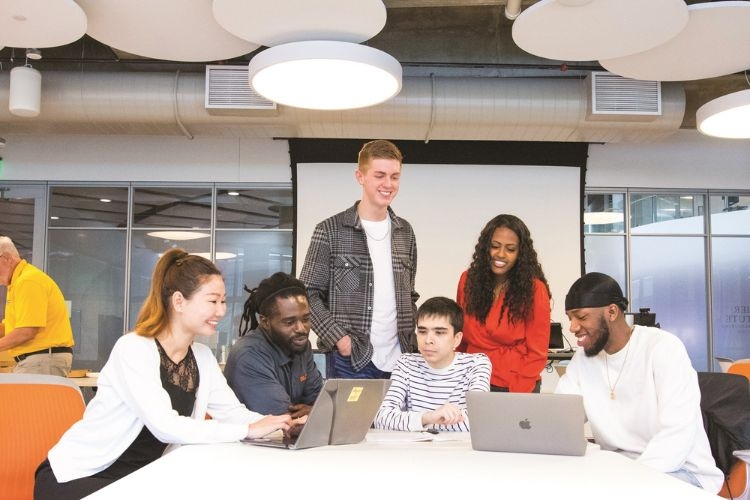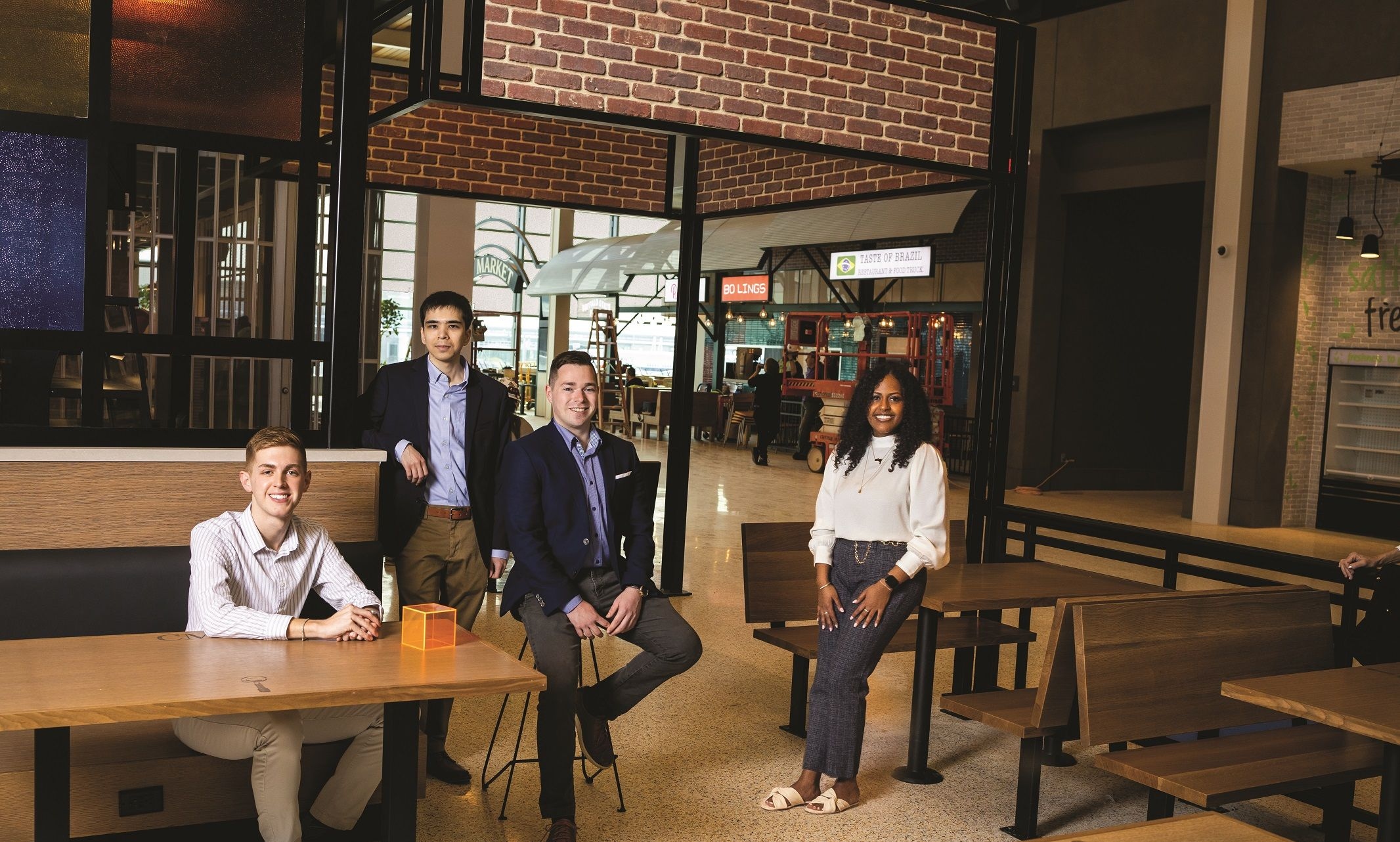As MBA student Msgana Teklebrhan Zegeye sees it, a business consultant’s job is to learn whatever a client needs them to learn.
That’s exactly what she’s done in her job as a student consultant employed with the Consulting Lab, a new Regnier Institute initiative at the Bloch School. With generous donor support, the Lab hires students like Zegeye to serve as pro-bono consultants for Kansas City-area entrepreneurs and small businesses. Working under faculty supervision, student consulting teams provide a range of services, including market research, business plan development and financial modeling.
The lab is designed to both provide opportunities for experiential learning and valuable consulting resources for the community, with a particular focus on entrepreneurs and small businesses from under-served communities. It also helps students develop critical thinking and problem-solving skills, analytic capabilities and communication skills.
As part of this effort, the Lab has partnered with several organizations that work with entrepreneurs from underserved communities. These partners have been instrumental in identifying clients that might bene-fit from the Lab’s consulting resources. AltCap, G.I.F.T., the Urban League, Pipeline Pathfinders and Pathway Financial Education have all been working with the Lab to create connections with potential clients.
The Lab also partnered with Vantage Airport Group, the company overseeing concessions at the new Kansas City International Airport. During this project, Zegeye and the other students on the consulting team worked with the local businesses preparing to open inside the
new concourse.
For all of the Bloch Consulting Lab projects, the consulting team must first understand the client’s business and the nature of the problem that they are being asked to address. Then they must develop a thorough understanding of any unique aspects of the client’s operation.

Working with concessionaires at the Airport, the consultants learned about special security precautions that affect how a business operates. They learned that restaurants can have knives, but only if the knives are tethered to a wall. They learned that employees must live at the address printed on their official ID and about other security requirements that might affect the available pool of employees. They learned about how the business model for a restaurant or store may need to change when operating inside an airport. They also learned about the challenges of attracting workers given the distance to the airport from where many potential employees live.
“I’m not going to say problems didn’t arise,” Zegeye says of her consulting work leading up to the airport’s grand opening. “But, figuring out how to manage them has been one of the best things.”
The Consulting Lab is a relatively new Bloch School initiative, opening just last summer. Friends of the school have provided both philanthropic support and creative ideas about how the Lab can be most impactful, both for students and the community. Mike Plunkett, co-founder of PayIt and chair of the Bloch Advisory Board, led productive brainstorming sessions with the Bloch Advisory Board about how to launch and support the Lab. Young Sexton, founder of WingGate Travel and the Sexton Family Foundation, advocated for leveraging student expertise to help underserved entrepreneurs accelerate growth at key stages of the entrepreneurial development cycle. Roger Nelson, former deputy chairman of Ernst & Young, developed processes for the Lab to support application-based learning and to enhance the effectiveness of consulting services.
Jeffrey S. Hornsby, director of the Regnier Institute and the Henry W. Bloch Endowed Chair of Entrepreneurship, is one of the faculty members overseeing student consulting teams. According to Hornsby,
“This is the perfect project for a school with a strong commitment to community engagement, one that reflects Henry Bloch’s long-standing vision for the school.”
In addition to their work at the airport, consulting teams worked with several clients identified through other organizations. This included projects for an entrepreneur with a strong, on-going business who wanted to expand via diversification into a related line of business, a technology firm in early startup mode who needed assistance with its business plan and a new venture that needed assistance with brand development.
While working with the Consulting Lab, students are assigned to teams and supervised by a Bloch School professor. The Lab, which plans to employ between 30 and 40 students annually in future years, is open to students from across business disciplines, which means the Lab will be able to offer a variety of services.
“It really offers great experience for students,” says Marvin Carolina, Jr., an assistant teaching professor who worked with the team of students assigned to the airport. “This is real time. This is real business. This is real life.”
With every project, student consultants start by listening to what their client is looking for and understanding their business goals. From there, they consider how best to provide support.
The student consulting team also highlighted how their work with other clients helped prepare them for the work with the airport vendors. Erik Klaas suggested that, “Over the summer, I was able to work with businesses and entrepreneurs in their early start-up stages. Those early experiences in working with small businesses provided me with a great foundation for taking on the airport project.”
“Most of these students have worked in jobs where they’ve earned a wage and gotten a W-2,” says Bruce Snyder, a faculty advisor to the lab who spent more than 30 years at Ernst & Young, a business management consultant firm based in Kansas City. “But to talk to a business owner and understand what it takes to succeed is not something out of a textbook where you’re given the facts and the numbers. These are not, by any means, textbook cases. They’re very fluid.”
“Helping businesses in urban, underserved communities overcome obstacles, to become stronger and cre-ate jobs will make communities stronger,” says Snyder. “Economic growth is the key to any successful urban community.”
From the Bloch students’ perspectives, the Consulting Lab is also designed to provide hands-on experience that will help them compete for top jobs when they’re ready to enter the business world.
Henry Meeds, who is majoring in management and accounting, says the experience he gained while working with the Consulting Lab helped him land a permanent job in New York City. When he graduates this spring, Meeds will step into a consulting position with PwC, one of the country’s top consulting firms.
“We’re getting hands-on experience during every part of the project,” Meeds says of his team’s work at the airport. “We’re doing things that maybe a partner would be doing at PwC.”
Nicolas Hartung, another student on the airport project, says the consulting work has made him a more confident communicator.
“In January, we went (to the airport) and delivered our project to all of the concession owners and opera-tors there,” he says. “It was a really cool experience because we saw how we’re helping them firsthand, and that they were actually going to take our advice and learn from it.”
As part of the experience, students learn to sell themselves, Snyder says. Although the lab doesn’t charge clients, students need to persuade clients to give them the time it takes to provide consulting for their businesses. Some clients realize that the students’ ages and perspectives can offer perfect measure for how their business plan will be received.
“Being candid, we’ve had some businesses come to us with what they think is a good strategy or a good development, but we’re scratching our heads and wondering how this would work,” Snyder says. “Then the businesses realize that if the students, who represent the demographic group they may be targeting don’t understand, it’s unlikely the general public will.”
Gaining a new perspective was a big reason Vantage’s general manager, Lovell Holloway was excited for the opportunity to work with Bloch’s student consultants.
“This is a once-in-a-generation opportunity and our vision was, how do we bring more people along?” Holloway recalls. “We have legacy behaviors around staffing, economic impact studies and internships. We wanted to break the norm.”
Holloway asked students to get involved in each of those areas as his company opened concessions at the airport.
“Having the perspectives of people from a younger generation only made sense,” he says. “They’d have fresh ideas and help us look at this from a better point of view.”

